
There were many people whom Cedric did not want to see, but there were few whose knocks he could honestly ignore.
He wiped his nose a last time and hid his handkerchief beneath his pillow before calling, “Enter!” His own voice sounded as gruff as a grown man’s after so many childish tears.

It was only cozy old Father Brandt, and Cedric was relieved and even heartened – until he remembered that Father Brandt had been sitting in the shadows all through his humiliation. Father Brandt had witnessed everything.
Cedric’s feeble attempt at a reply to the old priest’s greeting came out as a very sullen grunt.
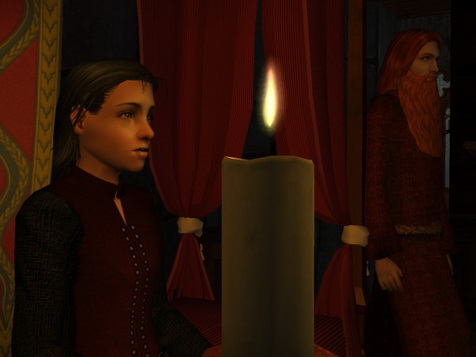
“Disappointed?” Father Brandt chuckled.
“No,” Cedric mumbled. “So long as you’re not Sigefrith.”
“We had better hope I am not Sigefrith for a while, Cedric,” Brandt said ominously. “Our King, I think, is very angry with thee.”

“Fine!” Cedric snapped. “Since I’m very angry at him!”
Father Brandt settled himself on the edge of the bed beside Cedric. He was so tall his feet still touched the floor.
“Because he denied thee?”
“No! Because of what he did to my sister!”
Father Brandt nodded thoughtfully, but he did not look outraged in the least.
“I know what you’re thinking!” Cedric snarled. “I know what I did. I’m talking about what he did. If he had wanted to say No, he could have simply said No! There! He didn’t have to do what he did!”
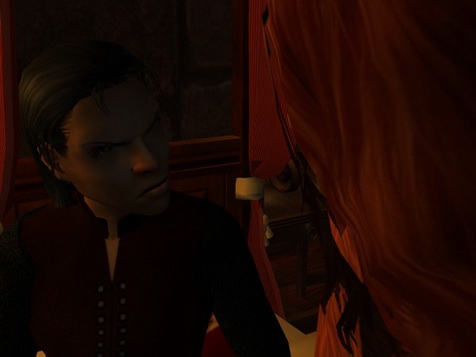
Father Brandt admitted, “No…”
“Because now, for the rest of her life, Eadie is going to think that a man got his head cut off because of her!”
Father Brandt only nodded.
“My sister!” Cedric said shrilly. “You know how she feels everything! She’ll never forgive herself! And I shall never forgive him for that!”
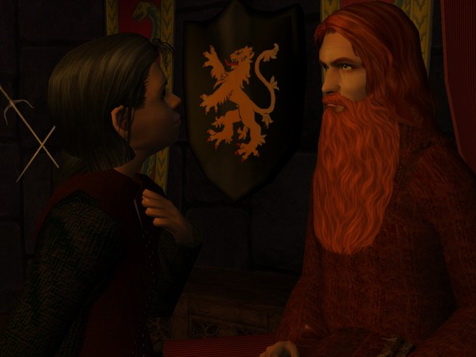
Father Brandt’s eyes were mournful, but it seemed he simply could not be made indignant.
Cedric scowled and twice sniffed deeply – once out of disgust, and once out of necessity – but when Father Brandt began patting over the pockets of his robe in search of a handkerchief to offer him, Cedric turned away with a childish sob and yanked out his own.
“I almost hate him!” he blubbered. “If I didn’t know it was wrong to hate!”
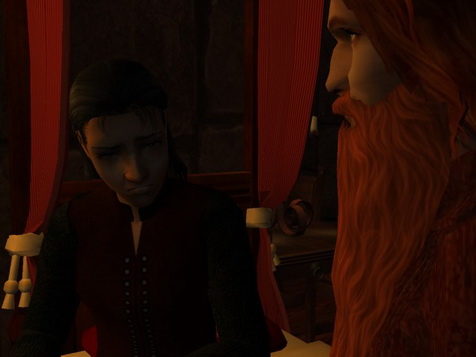
Brandt waited for Cedric to blow his nose and fold his handkerchief. Then he asked softly, “Cedric, hast ever seen a man hanged?”
“Of course!” Cedric huffed.
Brandt raised an eyebrow.
“I mean, from a distance,” he mumbled.
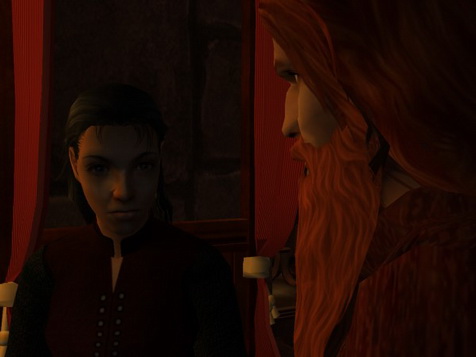
“Dost remember how long it took the man to die?”
Cedric shrugged his shoulder rather than admit he did not. He and the boys had been so riled up and giddy, he could only recall that it had not lasted long enough to satisfy them. He could not admit that, either.
“It may take a quarter hour,” Brandt said gravely. “And I think it must be agony. Some men are so lucky as to have a friend who will pull on their legs, to strangle them faster.” He folded his big hands over his knee and shook his head. “Imagine that.”

Cedric imagined. He imagined himself hanging his weight from the dangling, dying body of someone he loved: his brother… Colban… his father…
“And this Tidraed has no friends, it seems,” Brandt said. “And Eadie has told me he is afraid to die as his father died.”
“Did you go talk to her?” Cedric asked, shamefaced because he had not.
“I was with her just now,” Brandt said. “Before her husband came to her,” he added.
“Sigefrith is with her already?” Cedric whispered fearfully. Now Sigefrith would know he had abandoned his sister, on top of everything.

“I think he will be explaining to her what I explain to thee. Cedric, the axe is a kinder thing, though it may seem greater barbarity to cleave a man in two. It was all the mercy he could show.”
Cedric looked down at the toes of his boots, hanging several inches off the floor. Without his indignant anger to prop him up, he was beginning to feel very weak and babyish again.
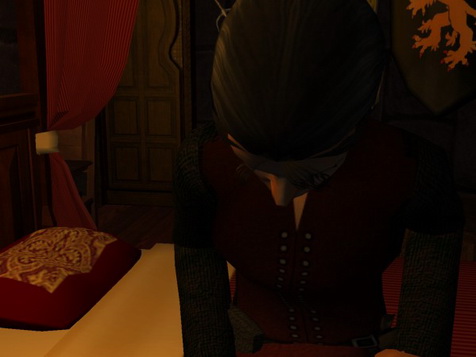
“But he must now explain this to his wife,” Brandt said mournfully, “about hanging, and beheading, and how one is worse than the other.” He sighed down into his beard. “He will forgive thee for defying him before he forgives thee this, I think. When thou art a man, Cedric, and hast wife and daughters in thy care, thou wilt understand that there are things we do not like them to know.”
Cedric had no beard into which his tears might slip, and instead they hung in stubborn drops along his chin. Father Brandt patted his shoulder heavily, man to man, and shook them free.
“Sons, also,” Brandt said. “But when they are growing into young men, they must begin to learn these things. Someone must know them, for someone must protect the ladies – even big sisters.”

“I know,” Cedric whispered.
“There is evil in the world,” Brandt said thoughtfully, “and we will protect them from it – that is all we should like them to know. Even so, Cedric,” he sighed, “I think the ladies know more than we think. But they pretend not sometimes, to protect us, too.”
Cedric could not help but glance up at the priest as he tried to puzzle out this paradox, but once Brandt’s green eyes had caught his own, he could not look away.

“Thou hast a good heart, Cedric,” he said gently. “But it is a simple goodness, as yet. And thou knowest only this kind. When we are young, good and evil are so easy to define.”
“I know – I’m just a stupid kid!” Cedric said, laughing bitterly through his tears. “‘That’s not how it works, kid!’” he cried, quoting Tidraed.
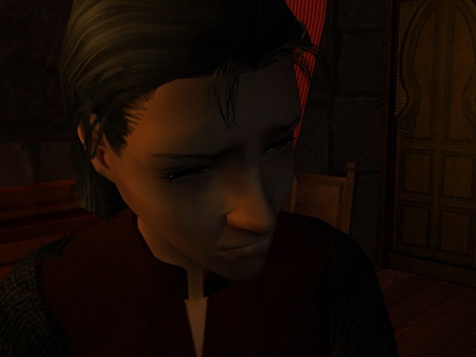
Then he sobbed at the thought of that man on the bridge, whom he had amused with his childish earnestness – “That simple! What a baby you are!” he had said. Amused, and perhaps moved – turned back, but not far enough.
Brandt patted his back again. “Through such trials we learn and grow wise. Thou and thy sister, you think on the man Tidraed, and you are sorry for him – the one man. But our King, he must think on all the men in his kingdom – all the men he has ever condemned for lesser crimes – all the victims – all the men and women and children he must protect. He cannot think on only one man, as thou.”
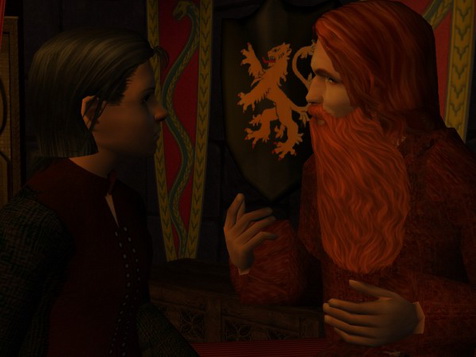
Cedric lifted his handkerchief and wiped his chin and his nose as he considered this.
There were thousands of people in the valley. His simple mind could not comprehend them all as individuals, and he wondered whether Sigefrith truly could. All the men and women and children were a blur of faces to him, but in his mind he could still see every seam on Tidraed’s callused hands, every wrinkle on his face, every hair on his head…
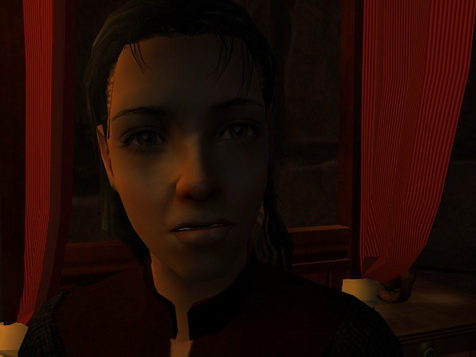
“But the Lord can think of each of them as only one man, can’t He?” Cedric asked. “‘But even the very hairs of your head are all numbered,’” he quoted.
Brandt smiled. “I’m certain He can.”
“So how can He bear to see any of them executed?” he challenged. “They are all worth more than many sparrows, and the Lord sees even a sparrow fall.”
“Ah, Cedric!” Brandt sighed. “It is a hard question.”
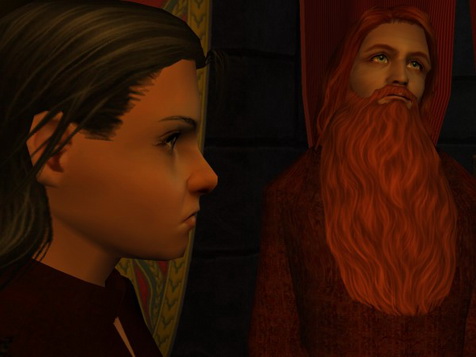
“But how?” Cedric asked stubbornly.
“Hast read The City of God?”
“Yes…”
“Then thou knowest what Saint Augustine said – a wiser, holier man than I. The King is but a sword in the hand of God – he is but the instrument of God’s wrath against the wrongdoer, as Saint Paul has said. It is in no wise contrary to the commandment against killing, if a king or governor puts an evildoer to death according to law, to protect the innocent.”

“But no one is truly innocent,” Cedric said. “And no man is truly evil, is he? Father Faelan said he never met one.”
Father Brandt shifted his big frame uncomfortably. “Ah? Didst ask him?”
“Not that. Perhaps I shall. Would he say something different?” he asked suspiciously.
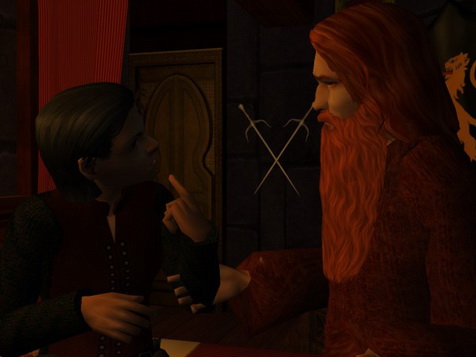
“We are only men,” Brandt explained slowly, “trying to understand God’s law as best we can. We are only priests… not kings. Our true concern is saving men’s souls – not saving their lives, which they will surely lose sooner or later.”
“But if they die sooner they will have less chance to repent.”
“Cedric,” Brandt sighed wearily, “I think that if a man will not repent in that critical moment when he knows his death is upon him and there is nothing left of his life, he would never have repented if he were allowed to live.”

“But perhaps something would have happened later to make him repent. Perhaps something that would have made him believe and trust in God. Perhaps no one ever made him believe yet.”
Brandt closed his eyes and let his chin drop into his fuzzy beard for a moment. When they blinked open again, he smiled sadly and patted Cedric on the head, man to boy.
“I am only an old Saxon priest. I do not pretend to have all the answers.”
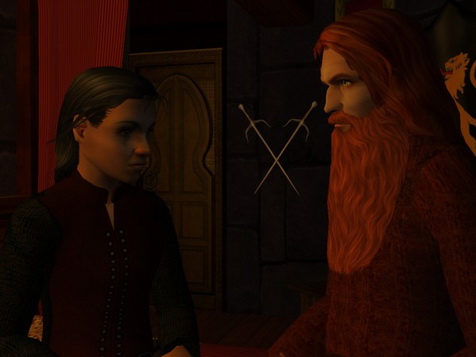
Indeed, the grave finality of his tone seemed to forbid further questions.
Cedric picked miserably at the hem of his handkerchief. He had appealed to man and king and God. He could ask no higher. And still he felt that something was not right with the world.
“Father Brandt, when did you decide to become an old Saxon priest?”
Father Brandt chuckled merrily, relieved that the difficult part of the conversation was over.
“When I was a young Saxon priest!”
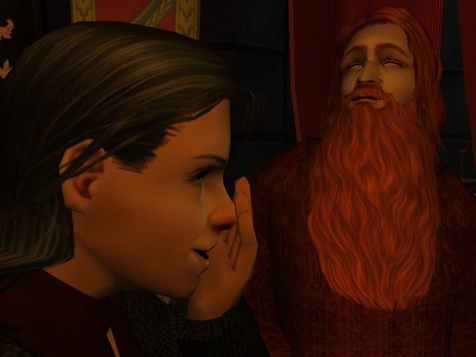
Cedric laughed weakly. “And when did you decide to be a young Saxon priest?”
“Ach! Never! In my house, the first son is a baron, the second son is a knight, and the third son is a Saxon priest. And so on forever! Throughout all ages, world without end – or so long as there is Saxony!” he laughed.
“So you always knew you would be a priest?”
“I was eight or nine before I ever realized I was a boy like the others and might ever have been elsewise. But I was nineteen when I decided to grow a beard,” he winked. “That was a big decision!”
Cedric tried to smile.

“What son art thou?” Brandt asked thoughtfully. “The second living son of thy father, I think me. And verily a knight-to-be! Who is the third?”
“Aeri is a few minutes older than Aef,” Cedric mumbled.
“Hmm! Already a page. We shall have to sneak in a few Bible lessons amongst the swordplay,” he whispered slyly. “But thy father has so many sons, we must think hard for the others. Let us say a lawyer and a diplomat – one argues over everything, and the other pretends to agree with everything?”

Cedric shrugged. “I don’t know… there are three more. How about a butcher, a baker, and a candle-stick-maker?”
Cedric felt empty and defeated, and if he could laugh with Father Brandt, he thought it was because he was too dried-out to cry. He folded up his handkerchief and put it away.







Oh, Cedric. What an existential crisis he's having. He's wrestling with a lot, poor kid. I felt really sorry for him for his pain over Eadie.